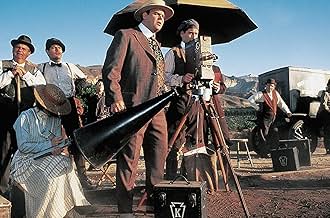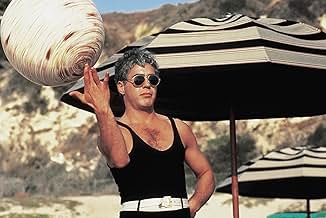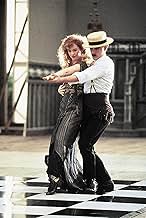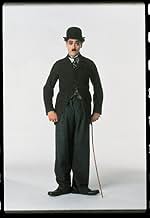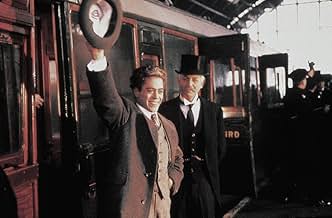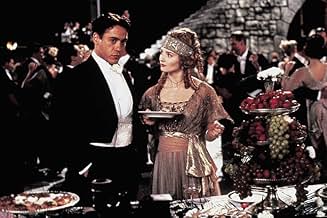Ein Film über das schwierige und umstrittene Leben des Meisterkomödianten Charlie Chaplin.Ein Film über das schwierige und umstrittene Leben des Meisterkomödianten Charlie Chaplin.Ein Film über das schwierige und umstrittene Leben des Meisterkomödianten Charlie Chaplin.
- Für 3 Oscars nominiert
- 3 Gewinne & 20 Nominierungen insgesamt
Deborah Moore
- Lita Grey
- (as Deborah Maria Moore)
Empfohlene Bewertungen
A film about the troubled and controversial life of the master comedy filmmaker Charles Chaplin.
What can I say? This was a really good film. It touched on all the highlights of Chaplin's career, both high and low. And even with the lengthy run time, I feel like it could have been even longer. It had such a great pace and was enjoyable to watch. And the cast. Wow. Milla Jovovich before she blew up? Diane Lane? Very good casting.
Robert Downey Jr nailed it. He has the look, he did the physical comedy, and that had to take a lot of training... the drunk routine, wow! I am so glad that Downey is back on top these days with "Iron Man" and other films. He had a rough patch for a while, but he is far better of an actor than he is generally given credit for.
What can I say? This was a really good film. It touched on all the highlights of Chaplin's career, both high and low. And even with the lengthy run time, I feel like it could have been even longer. It had such a great pace and was enjoyable to watch. And the cast. Wow. Milla Jovovich before she blew up? Diane Lane? Very good casting.
Robert Downey Jr nailed it. He has the look, he did the physical comedy, and that had to take a lot of training... the drunk routine, wow! I am so glad that Downey is back on top these days with "Iron Man" and other films. He had a rough patch for a while, but he is far better of an actor than he is generally given credit for.
Robert Downey, Jr. gives another one of his splendid performances, Kevin Kline is perfectly cast as Fairbanks, and most of the direction is superb. However, the story hops around a few too many times, and the scenes with Anthony Hopkins are weak and obviously placed in order to clarify things to non- Chaplin fans who watch the film. Overall it is enjoyable, especially the parts when we see him creating his well- known masterpieces. Recommended especially for movie fans, and most especially for Chaplin fans.
An attempt to make a film that is both honest and at the same time shamelessly self-serving about its (auto)biographical subject -- the legendary comedian/director Chaplin -- is pulled off with style. It's fun to see some modern talents inhabit the roles of screen's bygone icons (though in some cases a little less charicature would have been appreciated, especially in the case of Mabel Normand). Kline, surprisingly enough, makes a convincing Fairbanks. The rest of the cast is also well-picked -- X-Files fans should watch closely to catch quite a few glimpses of lower-billed David Duchovny as Chaplin's personal editor.
The direction is very good; I particularly liked how some of the straight scenes were filmed in a comic, surrealist style (Chaplin's escape from the police w/ his cans of "the Kid" reels is staged like a Keystone Komedy), while some of what might have been more comic elements are played straight (Chaplin's attempt to convince his brother that "The Tramp" cannot talk in a movie is both funny and serious, for example). Some of the (perhaps true to life) melodramatic elements are a bit overplayed (the bit with his mom was handled too heavily for my tastes, especially her shouting his name as she's dragged away by the asylum guards), but generally the film avoids genre cliches and "easy" scenes.
Great photography.
Downey Jr. fits the roll well, even rising to many of the physical challenges of the Chaplin mystique.
A superior film of its type, laced with self-conscious humor and self-reflection on the artistic temperament.
The direction is very good; I particularly liked how some of the straight scenes were filmed in a comic, surrealist style (Chaplin's escape from the police w/ his cans of "the Kid" reels is staged like a Keystone Komedy), while some of what might have been more comic elements are played straight (Chaplin's attempt to convince his brother that "The Tramp" cannot talk in a movie is both funny and serious, for example). Some of the (perhaps true to life) melodramatic elements are a bit overplayed (the bit with his mom was handled too heavily for my tastes, especially her shouting his name as she's dragged away by the asylum guards), but generally the film avoids genre cliches and "easy" scenes.
Great photography.
Downey Jr. fits the roll well, even rising to many of the physical challenges of the Chaplin mystique.
A superior film of its type, laced with self-conscious humor and self-reflection on the artistic temperament.
Thankyou to Richard Attenborough for this film. I watched it many a time and enjoyed both the biographical aspect and the comedic one but it has also increased my interest in silent comics of this great era.
The film begins by exploring the early life of Charlie, his Brother Sid and his Mother as they try to scrape a living. Thankfully Attenborough doesn't concentrate too much on this deprived part of Chaplin's life. However it does reveal interesting facts about Charlie that he never forgot during his rise to superstardom.
Although Chaplin is played by younger actors at the begining it is the arrival of Robert Downey Jnr which Chaplin fans will anticipate the most. He puts in an amazing performance, his London accent is excellent and ability to do slapstick even better he also really makes you believe that the great man is alive and on the screen again.
The film rightly concentrates on the private life of Chaplin and the development of the cinema. Whilst others may want to see the film concentrate on Chaplin's great pictures e.g The Kid, Gold Rush, and the Great dictator Attenborough blends the creation of these films into specific turning points in Charlie's life. For example Modern times is used to show Chaplin's sympathy towards victims of the wall street crash, as he knew what it was like to be extremely poor. His Jewish connections are also highlighted by the Great dictator, which shows his sensitivities to the European Jews were more at heart than just a making a heap of cash by having a laugh at Hitler's moustache and goose stepping troops.
The film doesn't get bogged down by Chaplin's hectic love life, as Dickie explores Charlie's political beliefs and how J Edgar Hoover was convinced of he was a communist party member. By doing so it shows how Hoover was one of the most twisted individuals to hold public office, with a dangerous obsession on peoples private lives and background.
The film does a good job in showing how important silent stars were and how we should not forget that they were the true greats when films were developing all the time from shorts to feature length, from silent to sound.
The film begins by exploring the early life of Charlie, his Brother Sid and his Mother as they try to scrape a living. Thankfully Attenborough doesn't concentrate too much on this deprived part of Chaplin's life. However it does reveal interesting facts about Charlie that he never forgot during his rise to superstardom.
Although Chaplin is played by younger actors at the begining it is the arrival of Robert Downey Jnr which Chaplin fans will anticipate the most. He puts in an amazing performance, his London accent is excellent and ability to do slapstick even better he also really makes you believe that the great man is alive and on the screen again.
The film rightly concentrates on the private life of Chaplin and the development of the cinema. Whilst others may want to see the film concentrate on Chaplin's great pictures e.g The Kid, Gold Rush, and the Great dictator Attenborough blends the creation of these films into specific turning points in Charlie's life. For example Modern times is used to show Chaplin's sympathy towards victims of the wall street crash, as he knew what it was like to be extremely poor. His Jewish connections are also highlighted by the Great dictator, which shows his sensitivities to the European Jews were more at heart than just a making a heap of cash by having a laugh at Hitler's moustache and goose stepping troops.
The film doesn't get bogged down by Chaplin's hectic love life, as Dickie explores Charlie's political beliefs and how J Edgar Hoover was convinced of he was a communist party member. By doing so it shows how Hoover was one of the most twisted individuals to hold public office, with a dangerous obsession on peoples private lives and background.
The film does a good job in showing how important silent stars were and how we should not forget that they were the true greats when films were developing all the time from shorts to feature length, from silent to sound.
This is a great example of a movie I took a chance on one rainy Sunday at a theater in Charlotte, NC., and was highly rewarded with an intriguing look at the life of an early film star set against the background of early Hollywood. I had't heard much buzz about it and didn't really know much about Charlie Chaplin. Downey is amazing in his personification of Chaplin. If you want to expand your horizons and learn a little about the inside workings of the film industry from circa World War I thru the 50's, this award-winning movie comes highly recommended.
Wusstest du schon
- WissenswertesGeraldine Chaplin played her real-life paternal grandmother Hannah Chaplin.
- PatzerWhen Charlie is shown at the 1972 Oscars near the end of the movie, he is showed being brought to the podium in the wheelchair and then standing at the podium as the movie clips played. In the actual awards ceremony, Charlie walked out to the podium under his own power after the clips ended.
- Zitate
German Diplomat: [offering his hand] Mr. Chaplin! I am a great admirer of yours.
Charlie Chaplin: I'm sorry, I prefer not to shake hands with Nazis.
German Diplomat: [laughs nervously] What have you got against us, Mr. Chaplin, hm?
Charlie Chaplin: What have you got against everybody else?
- Crazy CreditsThe film ends with the final scene of Der Zirkus (1928): Charlie Chaplin walks off into the distance.
- Alternative VersionenTo receive a 12 certificate the original UK cinema version was cut to remove one use of 'fucking' (during Charlie's homecoming visit to a pub). Later releases were uncut and upgraded to a 15 rating.
- VerbindungenFeatured in Friday Night: Folge #1.11 (1992)
- SoundtracksThe Honeysuckle and The Bee
Written by Albert Fitz and William H. Penn (as William Penn)
Top-Auswahl
Melde dich zum Bewerten an und greife auf die Watchlist für personalisierte Empfehlungen zu.
- How long is Chaplin?Powered by Alexa
Details
- Erscheinungsdatum
- Herkunftsländer
- Offizielle Standorte
- Sprachen
- Auch bekannt als
- Chaplin
- Drehorte
- Produktionsfirmen
- Weitere beteiligte Unternehmen bei IMDbPro anzeigen
Box Office
- Budget
- 31.000.000 $ (geschätzt)
- Bruttoertrag in den USA und Kanada
- 9.493.259 $
- Eröffnungswochenende in den USA und in Kanada
- 84.669 $
- 27. Dez. 1992
- Weltweiter Bruttoertrag
- 9.493.259 $
- Laufzeit2 Stunden 23 Minuten
- Farbe
- Seitenverhältnis
- 1.85 : 1
Zu dieser Seite beitragen
Bearbeitung vorschlagen oder fehlenden Inhalt hinzufügen

Oberste Lücke
What is the Hindi language plot outline for Chaplin - Das Leben der unsterblichen Filmlegende (1992)?
Antwort


